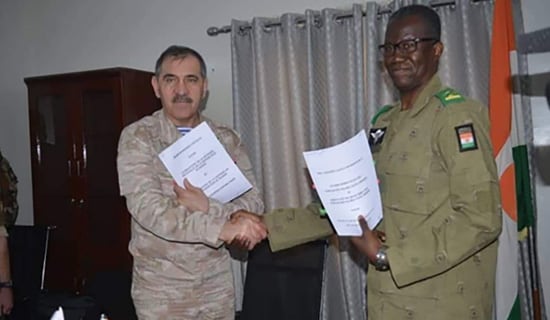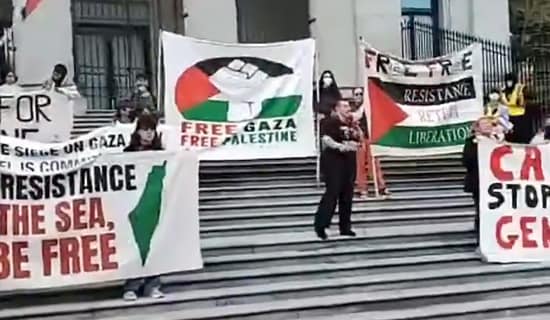Amid the ongoing fighting between Isael and Hamas in the Gaza Strip, which broke out following Hamas' October 7 deadly attack on Israeli localities near the Gaza border, Ibrahim Al-Amin, editor of the pro-Hizbullah Lebanese daily Al-Akhbar, wrote that the U.S. is holding talks with Egypt and Qatar in a bid to advance a deal for the release of civilian hostages. Under this deal all the civilians held by Hamas, including ones with American and other non-Israeli citizenship, as well as Gazans with American and other foreign citizenship, will be allowed to leave the Gaza Strip in return for a short ceasefire for bringing humanitarian aid into Gaza. According to the daily, Hamas claimed in response that not all the hostages are in its hands, demanded to distinguish between American nationals who civilians and ones who are Israeli soldiers, demanded a longer ceasefire and had conditions regarding the humanitarian aid to be provided.
The following are the main points of Al-Amin's report:[1]
U.S. Advancing 'Humanitarian Deal': Temporary Ceasefire And Delivery Of Humanitarian Aid To Gaza In Return For Release Of Civilian Hostages, Departure Of Foreign Nationals
Al-Amin writes that "the U.S. is pushing for a temporary ceasefire during which a 'humanitarian deal' will take place to let Gazans with American and other foreign citizenship leave the Strip and in order to release the American hostages." This, says, Al-Amin, is the focus of America's current contacts with Egypt and Qatar. The proposal involves "releasing all the civilian hostages, including American ones, and allowing 'foreigners' to leave the Strip" in return for the provision of medical aid and food to Gaza. Al-Amin adds that this proposal was relayed to Hamas via Qatar, who came back with "several questions and answers that were not to America's liking."
Hamas' Response Regarding Hostages: We Need A List Of Names; Not All Hostages Are In Our Hands; Not All Are Still Alive
Hamas, he says, asks to see the names of all the people who, according to the U.S. and European countries, are being held hostage in the Gaza Strip, and to see proof that they are civilians rather than soldiers who fought alongside the "occupation army" during Operation Al-Aqsa Flood (Hamas' name for the current war with Israel). The fate of those who prove to be soldiers will depend on a prisoner-exchange deal to liberate the Palestinian prisoners incarcerated in Israel.
Hamas also clarifies that it does not have a full list of all the hostages being held in the Strip, and that an investigation may reveal that some of those whom the U.S. is demanding were never brought into the Strip in the first place. It is possible that they were killed in the Gaza envelope and their bodies have yet to be recovered.
SUPPORT OUR WORK

Furthermore, Hamas says that not all the hostages are in its hands or in the hands of any one element, but are held by several different military factions and groups. Furthermore, some hostages were captured by Gazan civilians and have not been surrendered to the Hamas authorities.
Hamas adds that compiling a list of all the hostages in the Strip requires creating "a mechanism, which will take considerable time, and requires searching among all the forces and in all places." It states that some of the hostages have been killed in enemy airstrikes and some may be buried under the rubble, especially ones who are in the hands of unknown elements.
Hamas wants a "reasonable" ceasefire, longer than the six hours the Americans and Israelis are offering, and also wants guarantees that the humanitarian aid will be delivered immediately in return for the release of the civilian hostages. Furthermore, medical teams from outside the Strip must be allowed to enter with considerable humanitarian aid that is needed in the Gaza hospitals and with well-equipped ambulances that will take over 4,000 injured persons out of the Strip for medical treatment. The daily claims that several countries, among them Egypt, have agreed to receive them.
Another demand relayed by Hamas is that aid convoys currently waiting outside the Rafah crossing be allowed to enter the Strip and move safely throughout it without risk of being hit by airstrikes.
According to the report, Egypt has expressed its readiness to deliver all the required humanitarian aid to the Strip, but Egyptian President Al-Sisi informed U.S. State Secretary Blinken and the heads of the Egyptian armed forces that comprehensive lists must be prepared of all those who are to leave Gaza for medical treatment, and that Egypt will not allow "displaced persons or immigrants" to enter its territory.
U.S. Pressuring Hizbullah Not To Intervene
Al-Amin adds that Egyptian, Turkish and Qatari officials have informed elements in Gaza and Beirut that intense pressures are being exerted in the humanitarian context and that "these measures will be forced on Israel." This issue is the focus of the talks with the Americans, he claims. He also states that the U.S. urged these countries to press Hizbullah to refrain from intervening in the war, after hearing that Hizbullah's decision whether to intervene will depend not only on the scope of Israel's attacks on Gaza but on "the depth of the humanitarian crisis there."
According to Al-Amin, the U.S. is acting with Arab countries and Turkey to form a political alliance under its leadership, which will take advantage of Israel's military attacks on the "common enemy" Hamas. However, while the GCC countries and Morocco have agreed to join this alliance, Egypt, Saudi Arabia, Jordan and the Palestinian Authority (PA) have refused.
Furthermore, sources in the resistance axis note that, for the first time, strategic goals of the resistance – namely preventing the deportation of Gazans and the crushing of the resistance in the Strip – correlate with the interests of countries that do not support the resistance. Jordan, for instance, has expressed concern that the alliance the U.S. is trying to create is aimed not just at changing the political reality but also at changing the demography in the Palestinian territories. Jordan fears an influx of Palestinian refugees into its territory and the creation of an "alternative homeland" for the Palestinians there. It also fears that the U.S. plans to place Gaza under the authority of the PA's security apparatuses, who will be expected to prevent the presence of militants from Hamas and other factions there, which may lead to an inter-Palestinian civil war.
Resistance Axis Is Increasing Its Coordination; Iran Is In Charge Of Diplomacy
In light of all this, says Al-Amin, the various forces and governments of the resistance axis have increased their contacts and coordination, and "it seems that coordination on the ground exists in more than one arena and transcends the borders of Gaza and Lebanon." While the resistance forces are keeping silent mum about their potential reaction to the Israeli aggression, Iran has undertaken to manage the diplomatic response, he clarifies. It has received various messages from the U.S., via mediators like Qatar, urging it to stay out of the fray and pressure Hizbullah to do the same. Iranian Foreign Minister Amir Abdollahian said in response that that he had met with Hizbullah Secretary-General Hassan Nasrallah, who informed him that all possibilities were being considered and that the conflict could expand at any moment. Abdollahian also said that, if the hostilities continued, Iran could threaten the forces that support Israel, and then "nobody will be able to keep the situation under control."
[1] Al-Akhbar (Lebanon), October 16, 2023.




